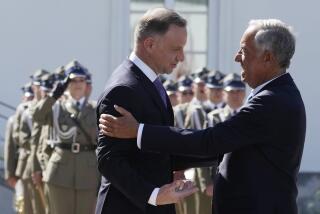Greek Missile Plans Risk Clash With Turkey, Experts Say
- Share via
ANKARA, Turkey — Greece and Turkey could slide into a military confrontation if the Greek government goes ahead with plans to deploy Russian-made surface-to-air missiles on the island of Crete, Western diplomats and military analysts here say.
“It’s absolutely possible for Turkish warplanes to fly within range of the missiles during routine flights in international airspace, for the missiles to lock onto them and for the Turkish planes to respond,” a senior Western diplomat warned.
The Greek-allied government on the Mediterranean island of Cyprus ordered the $450-million air defense system from Russia two years ago to strengthen its hand in negotiations with Turkey, whose troops occupy the northern third of the island.
However, Greek Cypriot President Glafcos Clerides agreed last month to not take delivery after Turkey threatened to destroy the S-300 missiles if they arrived from Russia.
Greece then announced that it would take the missiles and put them on Crete, a Greek island about 330 miles west of Cyprus on the edge of the Aegean Sea.
Greece’s decision to take the missiles is widely viewed as a face-saving compromise.
Turkey has about 35,000 troops on Cyprus, which has been divided since a 1974 Greek-Turkish war. Their presence remains the object of perennial U.N. condemnation and an obstacle to Turkey’s aspiration to join the European Union.
Turkish Prime Minister Bulent Ecevit, who ordered the Turkish occupation of Cyprus during a previous term in office, is still hawkish on the issue. Fearing a new armed clash over Cyprus, Washington helped persuade Clerides to forgo installing the missiles.
The Clinton administration now has the problem of how to respond to Greece’s plan, which Turkey says will shift the threat of new conflict from the eastern Mediterranean to the Aegean, where the two hostile neighbors have had territorial disputes.
Greece maintains that the missiles are being deployed for legitimate defense purposes.
“We hope the Americans don’t play along with Turkey’s blackmail tactics this time,” said a Greek official who, as did many asked about the diplomatic dispute, requested anonymity.
Turkey and Greece, both members of the North Atlantic Treaty Organization, came close to war in 1996 over the tiny islet of Imia in the Aegean. Their warplanes frequently skirmish in disputed airspace over the sea.
Sukru Sina Gurel, the hawkish minister of state for European and Cyprus affairs in Ecevit’s government, said in a recent interview: “The S-300 crisis will not be over until an open and very clear declaration on the part of the Greek Cypriots and Greek administration to the effect that these missiles will not be deployed in any place.”
Turkey says the deployment of the missiles on Crete, which hosts two NATO bases, would be a security threat to the Western alliance on several counts.
Turkish Foreign Minister Ismail Cem last month said deploying the missiles and putting them into operation in Crete will require the presence of a large number of Russian technicians and military officers. That would put Greece in the position of threatening a fellow NATO member with Russian help, he said.
In addition, Western military experts say, the missiles could bring down not only Turkish warplanes but Greek ones as well.
“One of the things you build into a system like this,” a senior NATO diplomat said, “is the ability to distinguish between good guys and bad guys. The Russians don’t have this in their software because we haven’t given them our [NATO] codes. [The Greeks] have to go to the Americans for help, one presumes, if they don’t want the missiles to lock on to their own planes.”
Moreover, the military analysts point out that Greece initially would need Russian help operating the missiles’ advanced radar system. NATO bases in Crete thus might fall under Russian surveillance.
“Tactically, the Turkish argument has a lot going for it,” a senior Western diplomat said. “It will put Greece on the defensive within NATO to legitimize what it has done. The Greeks have bought themselves a headache.”
The deeper worry among NATO governments is that tensions between Turkey and Greece could escalate, particularly if provoked by chest-thumping rhetoric in the run-up to parliamentary elections scheduled to be held in Turkey in April.
More to Read
Sign up for Essential California
The most important California stories and recommendations in your inbox every morning.
You may occasionally receive promotional content from the Los Angeles Times.













